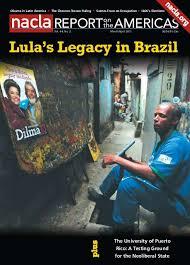Report
Sílvia Leindecker and Michael Fox
The Workers’ Party promised a new style of politics rooted in ethics and activism. But in order to win elections, the party had to make concessions. It embraced a coalition with rival parties, took kickbacks, and paid for votes. Now after Lula’s highly successful second term, the party appears to be back on track—but to where?
Under Lula, 20 million Brazilians were lifted out of poverty. Much of the credit for this achievement has gone to three key social policies: cash-transfer programs to the poor, aid to small farmers, and labor and pension reforms. But these programs all function within the neoliberal framework established before Lula came to power.
For the first time Brazil has a president who was elected not as an opposition candidate, but as a successor, continuing a government of unprecedented achievement, and following Brazil’s most popular leader since Getúlio Vargas.
Until Lula’s victorious 2002 campaign for president, the Workers’ Party had consistently supported a radical definition of agrarian reform. By 2002, however, its position had changed: Agrarian reform was no longer part and parcel of the fight for socialism, but rather an essential economic development policy.
João Feres Júnior, Verônica Toste Daflon, and Luiz Augusto Campos
For decades, racial issues in Brazil were largely absent from public debate. But all that changed with the introduction of affirmative action policies in higher education under the Lula government. Lula was a pragmatic but effective supporter of affirmative action, promoting a debate about the purpose of universities and their social function.
For most of his two terms in office, Lula followed the economic policies of his neoliberal predecessors. But the global financial crisis of 2007–9 forced a last-minute change in direction. Lula broke from the mold—he invested locally, raised the minimum wage yet again, and quickly lifted Brazil out of the meltdown as no one had expected.

